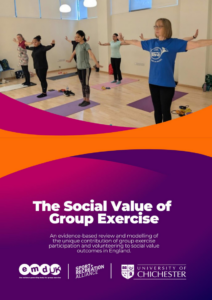The ‘Social Value of Group Exercise’ Evaluation Report Finds: Group exercise contributes more than £5.3 billion in social value and saves the NHS over £511 million per annum.
‘A vital component of our nation’s health’
A new report, commissioned by EMD UK, the national governing body for group exercise and funded by Sport England provides compelling evidence of the immense social and economic value group exercise delivers to society.
The findings of the EMD UK study compiled by the research team at the Sport & Recreation Alliance have officially been shared today [Tuesday, March 25, 2025] at a parliamentary reception hosted by EMD UK, attended by MPs, industry stakeholders and group exercise instructors.
Key Study Findings:
Group exercise …
Group exercise encompasses a broad range of activities, from high-energy classes like Zumba and Clubbercise to meditative practices such as yoga, Pilates and accessible seated workouts. This diversity promotes inclusivity and means that group exercise reaches people from all demographic groups across all ages and abilities making it a powerful tool for addressing inactivity, fostering social connections and improving both mental and physical health.
Gill Cummings-Bell, Chief Executive Officer of EMD UK, says:
“We have always championed the role of group exercise instructors in building healthier, happier communities. This report provides the hard evidence to back up what we already knew: that group exercise is a vital component of our nation’s health and should be recognised as such in future investment and policy decisions.”
Despite its undeniable benefits, the future of the group exercise workforce is at risk, with more than half (55 per cent) of instructors considering leaving the sector due to rising costs, such as facility hire and music licensing fees. To safeguard the continued impact of group exercise, EMD UK is calling on the government to:
1. Invest in the workforce through EMD UK to ensure instructors are supported, securing the £5.3 billion in social value they deliver annually
2. Recognise group exercise as a key component of social prescribing within the NHS, ensuring it is given equal footing with other activities proven to enhance public health
3. Strengthen access to group exercise programmes in communities nationwide, enabling more people to engage in regular physical activity regardless of background or ability.
The study findings are detailed in a comprehensive report, entitled: ‘The Social Value of Group Exercise’, compiled by EMD UK and the Sport & Recreation Alliance. Evidence presented in the report makes it very clear that group exercise is more than just a workout, it is a crucial intervention for improving public health, reducing NHS costs, and strengthening communities. By investing in group exercise, the government has an opportunity to drive long-term change, ensuring more people across the UK can enjoy the physical, mental, and social benefits that participation brings.
Gill adds:
“This report provides the first, concrete evidence of the value group exercise is delivering today. The 60,000 instructors delivering group exercise across the UK are perfectly placed to support the government in its ambition to improve population health, reduce inequalities, and promote healthy, independent lives. We very much hope that through evidencing the contribution group exercise is making to society, we can work together with government to help safeguard this vital resource, both now and in the future, to deliver a healthier, more prosperous Britain.”
Download a free copy of the full ‘Social Value of Group Exercise’ Report here.



